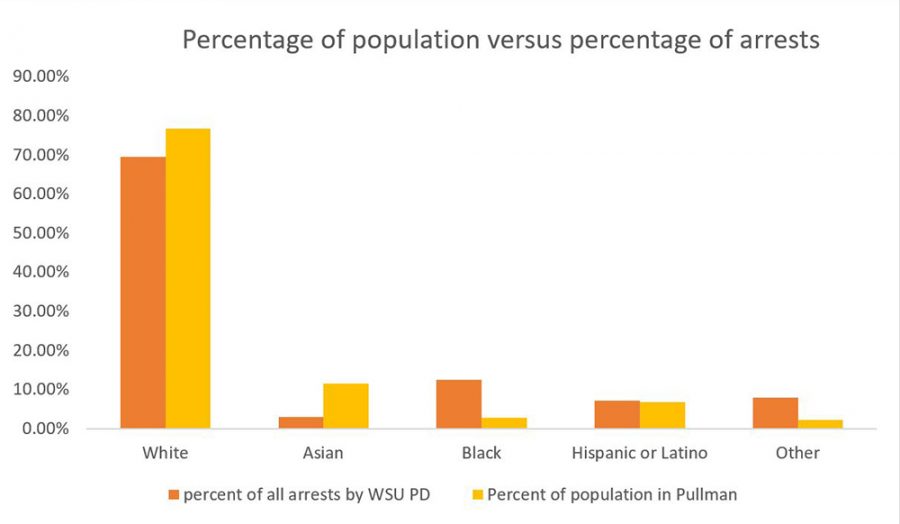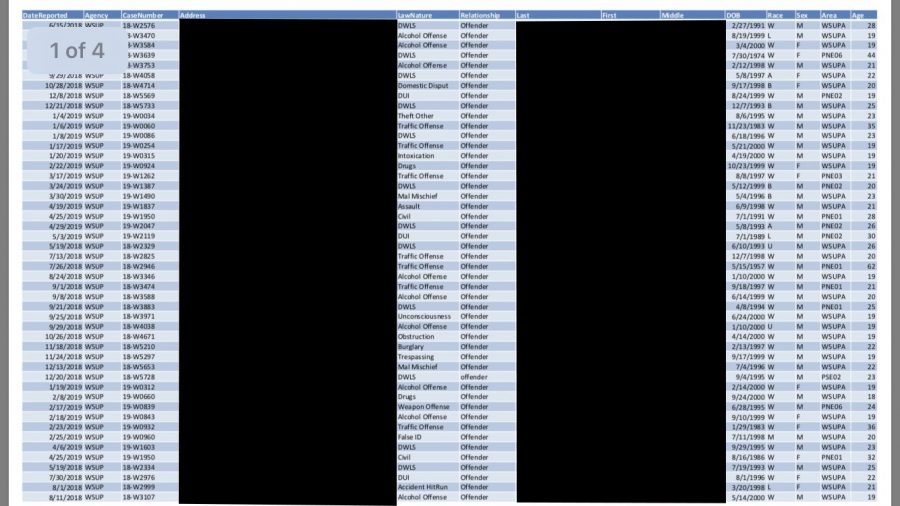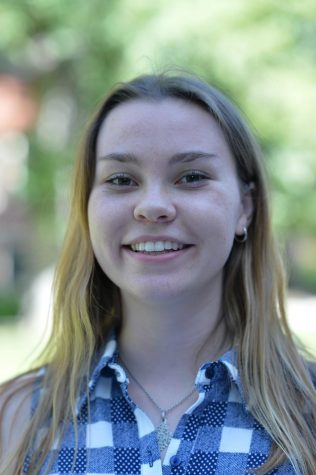Black residents nearly five times as likely to be arrested by WSU PD
More black residents arrested for traffic, drug-related offenses
RACHEL SUN | DAILY EVERGREEN ILLUSTRATION
Although 2.7% of Pullman’s population is black, the group makes up 12.5% of all arrests. White residents made up 76.8% of the population but accounted for 69.5% of arrests.
August 26, 2019
In the last year, 12.5 percent of people the WSU Police Department arrested were black, while 2.7 percent of Pullman’s population is black.
These calculations were based on arrest records from May 2018 to May 2019 and U.S. Census Bureau population estimates from July 2018.
Roughly 2.5 percent of black residents were arrested by WSU PD, while 0.6 percent of white residents were arrested.
In Pullman, black people were 4.7 times as likely to be arrested as white people in the recorded year. Nationally, black people aged 24-34 are 1.5 times as likely as white people to be arrested, according to data from a 2009 Adolescent Health Survey.
Black people accounted for 22 percent of traffic offenses and 30 percent of drug arrests by the WSU PD.
In other words, five out of about 945 black Pullman residents were arrested for a traffic offense, while 15 out of about 24,500 white residents were arrested for the same thing.
From those same numbers, six of those 945 black residents were arrested for a drug offense during the recorded year, while 11 of 24,500 white residents were arrested for drugs.
“The challenge is, these are not inputs that the police department controls,” said Phil Weiler, vice president of university marketing and communications.
Weiler also said police departments across the country are dealing with arrests disproportionate to the population.
Black and white Americans use and sell drugs at similar rates, but black Americans are 2.7 times as likely to be arrested for a drug offense nationwide, according to a report from the Hamilton Project.
Based on WSU PD arrest records, black people in Pullman were 14.2 times as likely to be arrested for a drug offense as white people and 8.7 times as likely to be arrested for a traffic offense.
The arrest rates reminded Weiler of increased reports of sexual assault, he said.
“Is that bad news or good news?” he said. “In many ways, it’s good news because we know crimes of sexual assault are underreported.”
There were 194 arrests from May 2018 to May 2019 overall, 24 of whom were black people. Weiler said arrest numbers this small might not mean much.
The WSU PD website includes photos of administration, sergeants, corporals and officers on its contact page. Of those listed, none are black.
“Across the institution, we want to make sure we have faculty and staff that represent our student body,” he said. “And clearly we have a long way to go.”
Of the people arrested, at least one black person and at least one white person were arrested twice.
The Daily Evergreen calculated arrest rates based on the number of arrests rather than the number of people arrested.
The number of white people arrested could be fewer than listed, as the records labeled several people “white” who had both first and last names of Indian origin, Saudi Arabian origin and Native American origin.
The Evergreen did not remove these people from the number of white arrests in the probability calculations.
The records listed five racial categories: black, white, pacific islander, latino, and “U” which included people with Arabic names.
WSU Police Chief Bill Gardner and Captain Mike Larsen did not reply to requests for interviews.
Assistant Chief Steve Hansen said he was not available for an interview and directed the Evergreen to Weiler.
The Evergreen also reached out to the WSU Black Student Union for comment.
“Black Student Union sees and recognizes the disparities within the populations being arrested here at Washington State University,” the Black Student Union wrote in a statement to the Evergreen.
Makayia Thompson, president of the BSU, declined an interview.
“Us talking about how terrible the system is won’t make them acknowledge it,” Thompson wrote.












Kim • Sep 4, 2019 at 3:49 pm
Given the racially motivated incidents that have occurred on WSU’s Pullman campus over the past several years I am dismayed to see the disbelief in the comments on this thread. While the arrest records used in calculating these comparisons is small, this is likely the best data available for public use. If you have suggestions for how to make this analysis more powerful and reduce errors, perhaps you might assist in creating a data set and analyzing it. If these one-year findings are indicative of a longer-term trend, this is a serious problem. Even without further analysis it disturbs me deeply to see arrest disparity this drastic on our own campus this past year. This does not make me a proud Coug. I am embarrassed to attend a University where systemic racism goes unquestioned, and where those perpetuating racism through their actions and choices are completely unaccountable. This kind of a culture is completely at odds with the University’s stated values, and with the Drive to 25 goal. I would challenge everyone who reads this article, and who has posted a defensive post, to dig deeply and ask yourself what is motivating that response and posture. Why do you feel uncomfortable in the face of hard evidence that for at least this past year, the WSU police force have no explanation to give for this disparate record of arrests? As Cougs, we all share responsibility for acting on and cultivating a culture which reflects WSU’s values including Integrity, Trust, and Respect and Diversity and Global Citizenship. The Coug community can do much, much better in living up to our own standards and values. It saddens me that I am the first to post a comment that takes this stance. I encourage others who are allies for diversity, equability, and inclusion to speak up and speak out as well.
Susan Cao • Aug 26, 2019 at 9:52 am
The statistics you are using are a logical fallacy. You are using the WSU police (which is responsible for the WSU campus and nearby environment) and using the demographic data of the ENITRE city of Pullman.
Either you have to use the demographic data of JUST WSU students (which is closer but not exact here either since may of them live away from campus and not in WSU Police general patrol areas) or you have to use arrest statistics of the ENTIRE TOWN – including the Pullman Police Department, the Whitman County Sherrif’s Office and the WA State Highway Patrol within Pullman city limits data.
By cherry picking one set of demographic data (Pullman at large) and only including part of the arrested person demographic (within WSU Police reports) you are NOT reporting fact, but “alternative facts”. It is a big university – find a trained statistician to help you do it right.
Jake • Aug 26, 2019 at 9:45 am
Good article, but one thing that bothers me is that the headline is a bit misleading. The headline “Black residents nearly five times as likely to be arrested by WSU PD” sounds to me like there is a trend, but the information cited is based off of one year’s worth of data. If there has been a trend of disproportionate arrests since, say, 2015, then that would be more deserving of a headline like this. One year of disproportionate arrests could mean many things, as there are so many different factors involved in arrest data. I feel a more accurate headline would be “Black residents were almost five times as likely to be arrested by WSU PD during the 2018-2019 school year.”
Jeff • Aug 26, 2019 at 8:04 am
One should ask, did they commit a crime not just make a blanket statement misusing the statistics. If they haven’t committed a crime this bothers me, if they have it does not. If you deserve to be arrested you should be arrested skin color irrelevant.
Jeremy Topp • Aug 26, 2019 at 7:54 am
Well, this is why you should take uber. male sure your car maintained and don’t be provocative. I don’t think cops are racist but I’ve seen a lot of careless that gets people arrested.